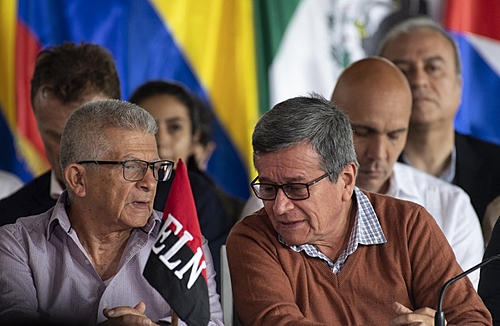
The delegation of the National Liberation Army (ELN) and the government of Colombian President Gustavo Petro released last Saturday (24) four points agreed between the parties to achieve peace. The document is the result of a new round of negotiations taking place in Mexico City, the country’s capital, and which began on February 13th.
The first point is the “legal characterization of the ELN as a rebel armed political organization with which the National Government is negotiating peace”. the colombian newspaper The viewer points out that one of the leaders of the ELN, Antonio García, has already criticized the government for placing the leftist-inspired armed group in the same “group” of drug trafficking organizations as the Clan of the Gulf.
Remember: Leader of the largest active guerrilla in Colombia assesses challenges for peace with Petro’s government
“It is clear that we cannot move forward on substantial issues on the agenda without resolving this point. The government is advancing in the search for a legal solution,” said one of the members of the negotiating team to The viewer.
Other points envisaged in the partial agreement are the creation of a “point of contact and communication” for dialogue with the ELN, the analysis of denouncements of human rights violations presented by both delegations and the monitoring of proposals by the Ministry of Justice of Colombia to “humanization of prison policy”. The full document can be viewed no link.
:: Gustavo Petro: who is the president of Colombia? ::
“We have a common vision of peace. The government has always recognized the nature of the ELN as a political, military and rebel group,” Senator Iván Cepeda, who is part of the government’s peace negotiating team, told BlueRadio.
Germany, Spain, Sweden and Switzerland follow the new round of peace talks. The closing of the negotiating table is scheduled for March 10, with the expectation of a possible agreement.
Understand
The ELN is one of the armed groups in Colombia that remains mobilized after the Revolutionary Armed Forces of Colombia (FARC) abandoned its weapons and transformed itself into a political party. Negotiations for peace between the government and the FARC earned then-president Juan Manuel Santos a Nobel Peace Prize in 2016. His successor, however, the right-wing Iván Duque, left the negotiating table with other Colombian armed groups and popular movements denounce that his government has not fulfilled the points of the peace agreement, in addition to the high rates of violence against social leaders.
Gustavo Petro, in turn, bets on the resumption of negotiations and has a “total peace” program. At the beginning of the year, the current president even announced a ceasefire with the ELN on December 31, but the armed group withdrew days later.
Editing: Vivian Virissimo
Source: www.brasildefato.com.br

